Latest News
Why JNU wants its “mobster” vice chancellor Jagadesh Kumar gone
Hundreds of protesters, including faculty members and students of the Jawaharlal Nehru University (JNU) protested near Mandi House today demanding removal of Vice-Chancellor M Jagadesh Kumar.
Published
6 years agoon
By

Hundreds of protesters, including faculty members and students of the Jawaharlal Nehru University (JNU) protested near Mandi House today demanding removal of Vice-Chancellor M Jagadesh Kumar. The protesters marched from Mandi House to the Ministry of Human Resource Development (MHRD) lamenting Kumar’s questionable handling of violence on Sunday when over 30 students and faculty members were beaten up with iron rods and hammers.
Calling Kumar a “mobster”, the JNU teachers association (JNUTA) said the prestigious university has suffered immensely during his autocratic rule.
The VC is being severely criticised for his role in dealing with the violence that erupted on Sunday evening. Students, alumni, and teachers termed Jagadesh Kumar incompetent for the job.
Mamidala Jagadesh Kumar, who took charge as the Vice-Chancellor of JNU in 2016, has been since been criticised over a host of issues on the campus. His tenure is riddled with episodes of mismanagement.
A professor of electrical engineering at IIT Delhi before being appointed as JNU VC in January 2016, he has repeatedly dismissed allegations of his allegiance to a particular political organisation.
Kumar, who comes from a pure science discipline, was given the charge of administering JNU, an eminent institution of humanities disciplines in the country.
Kumar was hadpicked by the then President Pranab Mukherjee despite HRD ministry’s objections. Smriti Irani, was not in favour of appointing him, since Kumar was teaching at IIT-Delhi then, and Irani felt he didn’t fit the university system.
Here are some of the instances where his role was found to be either lacking or questionable.
Kumar’s first brush with controversies was on February 9, 2016, when some students affiliated to Left student organizations organised an event on the third anniversary of the hanging of Afzal Guru to protest his capital punishment. Just moments before the event, the permission was withdrawn by the administration allegedly under the pressure from RSS-affiliated Akhil Bharatiya Vidyarthi Parishad (ABVP).
However, students went ahead with the protest and anti-India slogans were allegedly shouted by then JNU students’ union president Kanhaiya Kumar and others, who were then charged with sedition.
A few months later, Najeeb Ahmed, a first-year MSc student at JNU, went missing after an alleged brawl with members of the ABVP at Mahi-Mandavi Hostel in Delhi. The JNU VC’s alleged inaction in his disappearance was severely criticised. The students alleged that he took no action against the ABVP activists who assaulted Najeeb before he went missing.
In the beginning of 2017, while attending an event to commemorate the Kargil victory, the Vice-chancellor spoke about installing a tank on the campus to instill patriotism in students. The university had celebrated ‘Kargil Vijay Diwas’ for the first time on campus.
A few months later, Kumar approached the Delhi High Court to prohibit students from protesting in the vicinity of the administration block of the university. The university had alleged that due to continuous agitations and sloganeering, the normal functioning of the administrative couldn’t happen.
Later in that year, for the first time in the history of the JNU, the JNUSU was not called for the Academic Council meeting, the highest decision-making body of the varsity. JNUSU and JNUTA said the JNU statute mandates that the JNUSU officers are special invitees to the Academic Council and by not doing so they have “illegally debarred” the legitimate student representation.
Around September 2017, Kumar’s administration through an allegedly arbitrary move, dismantled Gender Sensitisation Committee against Sexual Harassment (GSCASH) in an executive council meeting citing University Grants Commission guidelines. They replaced it with a new, largely nominated body – Internal Complaints Committee. The students protested against the move for months and even conducted elections to it by defying a circular from the administration that the committee was non-existent.
In 2018, the administration ordered the delinking of MPhil and PhD. courses, the move was followed by massive uproar from the student community. The order stated that the entrance exams will be held only for the MPhil programme and upon completing their MPhil they would have to apply afresh for the Ph.D programme
In April 2018, the VC was accused of “wrongfully implementing” the May 5, 2016, UGC Gazette to unleash massive seat cuts in MPhil/PhD programmes.
In the MPhil/PhD admissions for 2017-18, the reservation for SC was 1.3% rather than the mandated 15%, for ST it was 0.6% rather than 7.5%, for OBC it was 8.2% rather than 27% and for the PWD it was 0.3% rather than the mandated 3%,” said a release from SC/ST/OBC/PWD Students and Teachers of JNU.
In the same year, the students had alleged that the administration had slashed the annual library funds from Rs 8 crore to Rs 1.7 crore and stopped auto-renewal of several e-journals and subscriptions saying that the University Grants Commission has refused to release funds.
In 2018, the JNUSU accused the administration of unilaterally increasing the entrance exam fee by over 300 per cent, delinking MPhil and PhD courses without proper procedure, denying deprivation points to students in reserved categories, and blocking opportunities to conduct research.
Around August last year, the JNU teachers’ association alleged that the varsity rules were bent to accommodate right-wing candidates. The VC by amending the JNU statutes had delegated to himself the power to add names to the panel of experts which decides on the new names for appointments. This changed the earlier procedures, weakening the Academic Council’s role in faculty appointments.
Kumar was accused of political nepotism in filling up teaching positions in JNU. Former ABVP leader Tapan Bihari and former JNUSU Joint Secretary of the ABVP Saurabh Sharma among others were appointed as faculty members.
Around September, a fresh controversy hit the JNU after its emeritus professors over 75 years of age, including historian Romila Thapar and economist Prabhat Pattnaik, were asked to submit their work in the last two years for an evaluation. The move drew flak from academics from across the country.
For the past few months, the University has come to a complete standstill and the students are on the verge of losing a semester due to ongoing protests against a massive hike in hostel and mess fee. There was a whopping 300% hike in rent structure.
During the university’s convocation in November last year, the HRD Minister was allegedly held hostage by protesting students as the VC had refused to meet the students who wanted to discuss the fee hike.
Last week, the students boycotted the registration for the semester. Out of around 8,000 students, only 800 registered, which apparently brought the semester to a standstill.
You may like
-
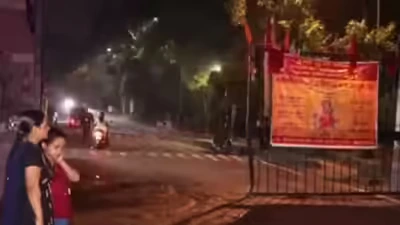

Clashes break out at JNU over Ravan Dahan depicting Umar Khalid, Sharjeel Imam
-
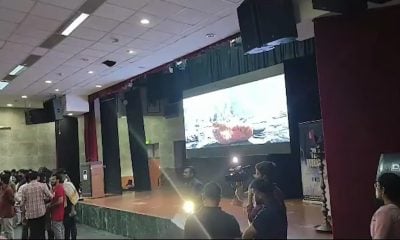

72 Hoorain in JNU: Student union condemns the screening of film
-
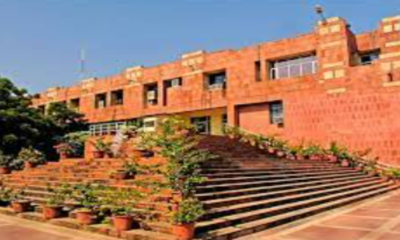

Twitter users shocked over new JNU rule imposing Rs 20,000 fine for protestors
-
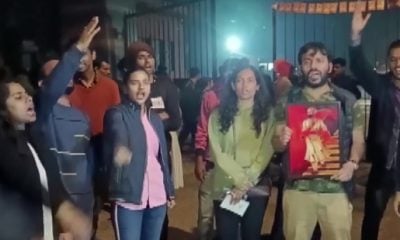

Shivaji’s portrait vandalized by JNU Students’ Union, claims ABVP; Left group alleges assault
-


JNU’s vandalised Anti-Brahmin slogan trigger row, VC orders probe
-


No God is Brahmin, Lord Shiv is Dalit: JNU VC replies on controversy over her remarks about caste of Hindu gods
Entertainment
Kapil Sharma warned by MNS for referring to Mumbai as Bombay on Netflix show
Published
5 months agoon
September 12, 2025
Bollywood comedian Kapil Sharma has come under the radar of the Maharashtra Navnirman Sena (MNS) after the use of the term Bombay instead of Mumbai on his Netflix show The Great Indian Kapil Show. MNS spokesperson Ameya Khopkar issued a warning, stating that the usage of the city’s former name could hurt the sentiments of its residents and demanded that the correct name, Mumbai, be used.
The controversy arose during an episode featuring actress Huma Qureshi, her brother Saqib Saleem, and the Shetty sisters. While talking about her bond with Saqib, Qureshi referred to the city as Bombay, explaining that she felt at home with him despite not being originally from the city. This comment drew criticism from the MNS, who have historically been vocal about protecting the identity and pride of Mumbai.
In a post on X, Khopkar stated in Marathi, that even though 30 years have passed since Bombay was officially renamed Mumbai, the term Bombay is still frequently used by celebrity guests on The Kapil Sharma Show, Delhi-based Rajya Sabha MPs, show anchors, and in many Hindi films. He noted that the name change was officially recognized by the Maharashtra government in 1995 and by the Central Government in 1996, preceding similar renamings in other major cities such as Chennai, Bengaluru, and Kolkata.
Khopkar further emphasized the seriousness of the matter during a media interaction in Mumbai. He stated that Sharma had been working in Mumbai for many years and described the city as his land of work. He added that the people of Mumbai admire him and watch his shows, and warned that the city and its residents should not be insulted, cautioning Sharma against repeating the mistake.
He added that if the reference had been made unintentionally, the mistake should be corrected immediately. Khopkar stated that all guests on the show, including celebrities and the host, should be informed in advance to refer to the city as Mumbai. He warned that if this is not followed, the MNS would launch a strong agitation.
The Great Indian Kapil Show has recently been renewed for a third season. Its first two seasons, comprising 13 episodes each, premiered in 2024, featuring a mix of Bollywood celebrities and entertainers. The controversy marks one of the few instances where the city’s political groups have publicly intervened over the naming of Mumbai on popular entertainment platforms.
Latest News
Indian-origin motel manager beheaded in the US
Published
5 months agoon
September 12, 2025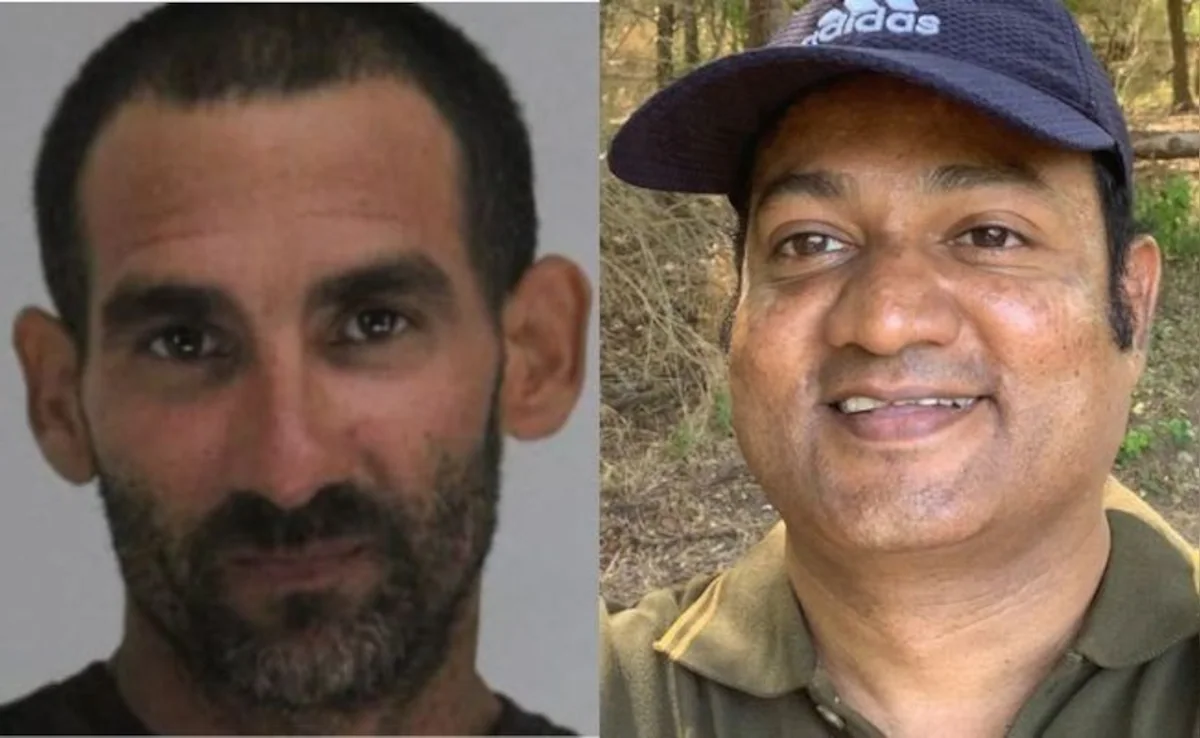
In a horrifying incident in Dallas, Texas, an Indian-origin motel manager, Chandra Nagamallaiah, was brutally beheaded by a guest following an argument over a malfunctioning washing machine. The gruesome attack was carried out by 37-year-old Yordanis Cobos-Martinez in front of Nagamallaiah’s wife and children, leaving the family traumatized.
According to court records and affidavits, the confrontation began when Nagamallaiah reportedly told Cobos-Martinez not to use a broken washing machine at the Downtown Suites motel. The suspect became enraged, partly because the manager relied on a woman present for translation instead of speaking directly to him. Surveillance footage later revealed Cobos-Martinez producing a machete and repeatedly stabbing and cutting Nagamallaiah, despite the efforts of his wife and child to intervene.
The affidavit details that the victim tried to flee to the motel’s front office while screaming for help, but the attacker followed him and continued the assault. Cobos-Martinez removed Nagamallaiah’s key card and cellphone before ultimately beheading him. Disturbing footage reportedly shows the suspect kicking the severed head across the ground before throwing it into a trash bin.
Cobos-Martinez, a Cuban national with a long criminal history, including convictions for grand theft, carjacking, false imprisonment, and sexual offenses, was arrested shortly after the attack. Authorities found him a block away wearing a blood-soaked T-shirt, along with the victim’s key card and cellphone. U.S. Immigration and Customs Enforcement (ICE) officials noted that Cobos-Martinez should not have been in the country at the time, as previous attempts to deport him to Cuba were unsuccessful due to his criminal record.
The Department of Homeland Security described the beheading as unthinkable and stated that the case highlights the critical need for strict immigration enforcement. A witness to the attack told NBC DFW that they could not explain what they saw, describing the suspect as appearing there and not there at the same time, emphasizing the surreal and terrifying nature of the crime.
This shocking incident has left the Dallas community and Nagamallaiah’s family in deep distress, as authorities continue their investigation into the motive and circumstances surrounding the brutal murder.
India News
AAP MP Sanjay Singh accuses J&K authorities of house arrest, Farooq Abdullah condemns move
Published
5 months agoon
September 11, 2025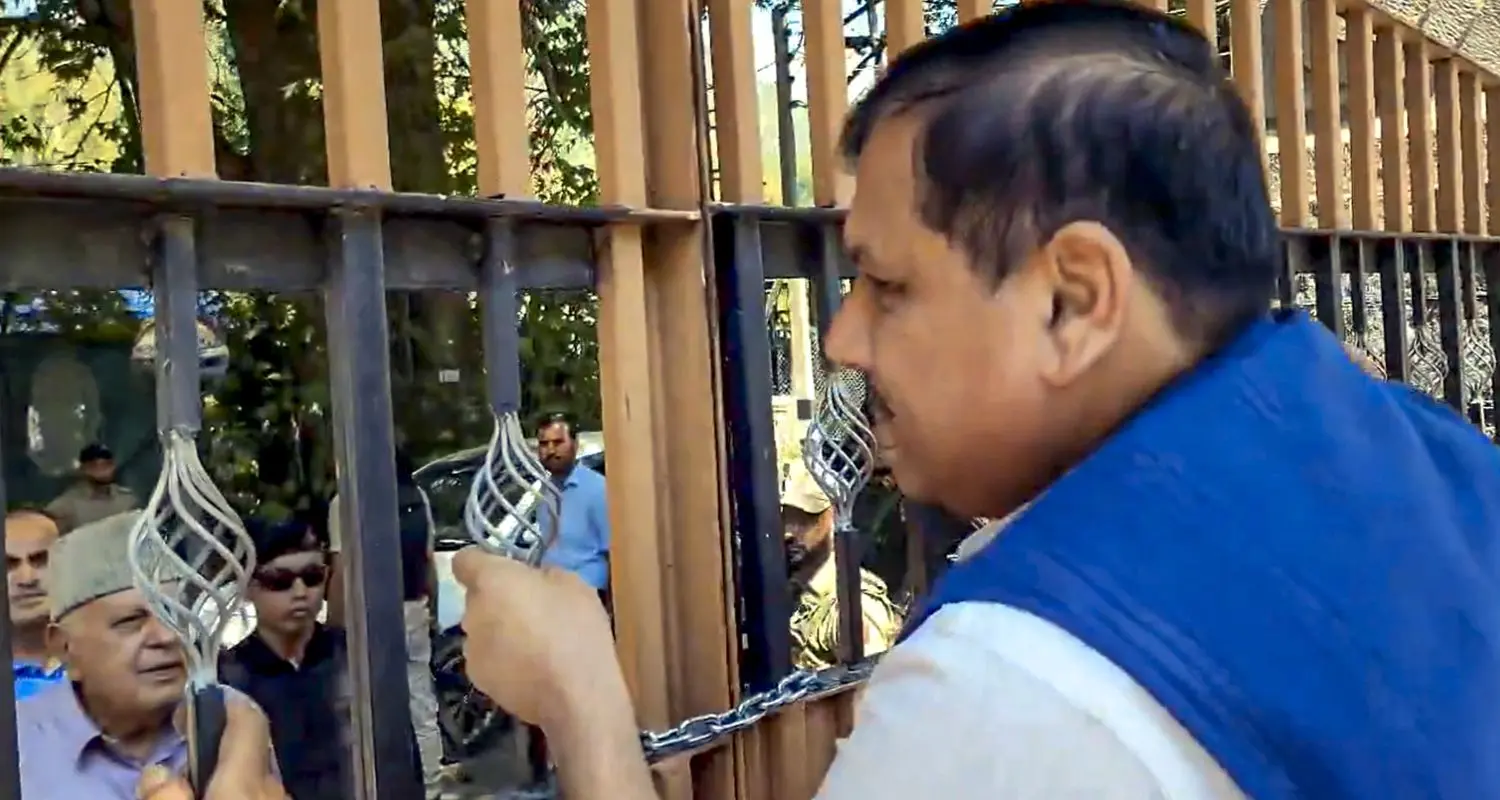
Aam Aadmi Party (AAP) MP Sanjay Singh on Thursday accused Jammu and Kashmir Lieutenant Governor Manoj Sinha of placing him under house arrest while he was in Srinagar to protest the detention of the party’s sole J&K MLA, Mehraj Malik.
Singh climbed the gate of a government guest house in Srinagar to meet National Conference (NC) chief Farooq Abdullah and later shared visuals of the interaction on social media. He said it was a very sad thing that Abdullah, who has served multiple terms as Chief Minister of Jammu and Kashmir, came to meet him at the guest house after learning about his alleged house arrest but was not allowed to do so. Singh further questioned the authorities’ actions, asking whether if this is not dictatorship, then what it is.
Malik, the MLA from Doda Assembly seat, has been detained under the Public Safety Act (PSA) on charges of disturbing public order. This marks the first instance of a sitting lawmaker being booked under the PSA, which allows authorities to detain individuals without charge or trial for up to two years. Singh alleged that Mr. Malik’s detention was retaliation for raising people’s issues in his constituency.
Abdullah also condemned the attempts to stop Singh from holding his protest. In a statement to news agency ANI, he said that preventing Singh from exercising his right to protest was absolutely wrong and accused the Lieutenant Governor Sinha of misusing his powers. He stressed that the right to protest is guaranteed by the Constitution of India, noting that Jammu and Kashmir being a union territory gives the LG significant authority, which, according to him, was being used for the wrong purposes. Abdullah questioned whether it was necessary to prevent Singh from speaking and asserted that this is not an autocracy, there is a constitution here.
Abdullah drew parallels with the recent unrest in Nepal, where protests led to the resignation of Prime Minister KP Sharma Oli, and cautioned that India must safeguard its Constitution to prevent similar circumstances. He urged the LG to uphold constitutional principles, warning that failure to do so could risk unrest, and emphasized the need to take care of the Constitution before such a fire breaks out in the country.
Other opposition leaders, including AAP chief Arvind Kejriwal and Shiv Sena (UBT) leader Sanjay Raut, also expressed concern over the move, condemning what they described as an infringement on democratic rights.

India studying implications after US Supreme Court strikes down Trump’s global tariffs
RSS not seeking political power, focused on uniting Hindu society, says Mohan Bhagwat

PM Modi meets Sri Lankan President Dissanayake at AI summit, reviews connectivity agenda

Trump signs 10% global tariffs after US Supreme Court setback





